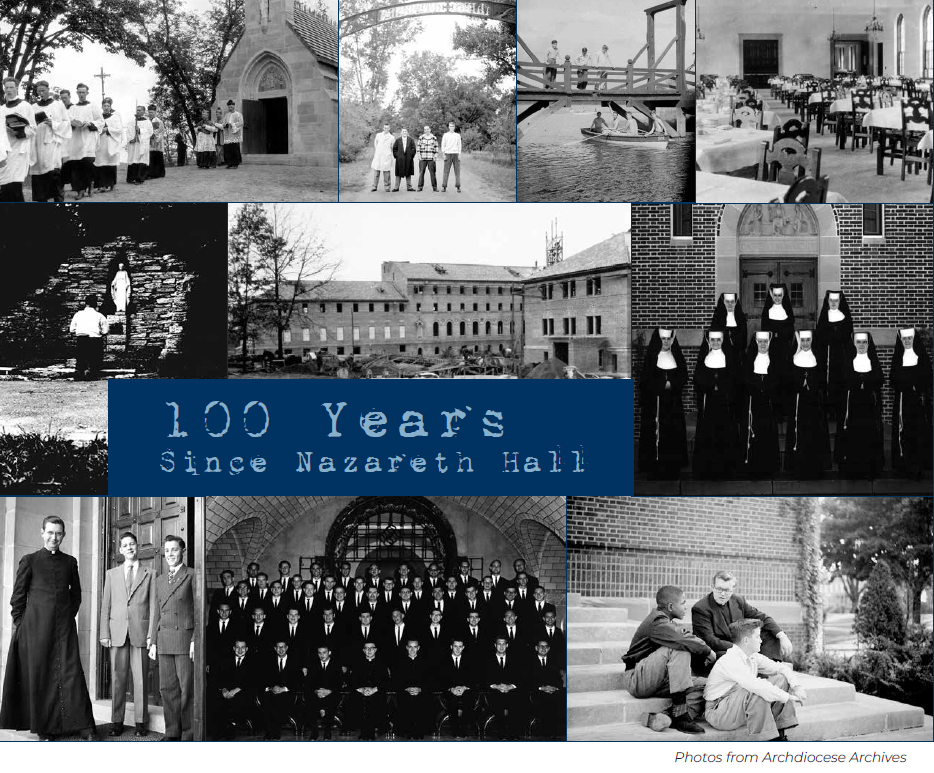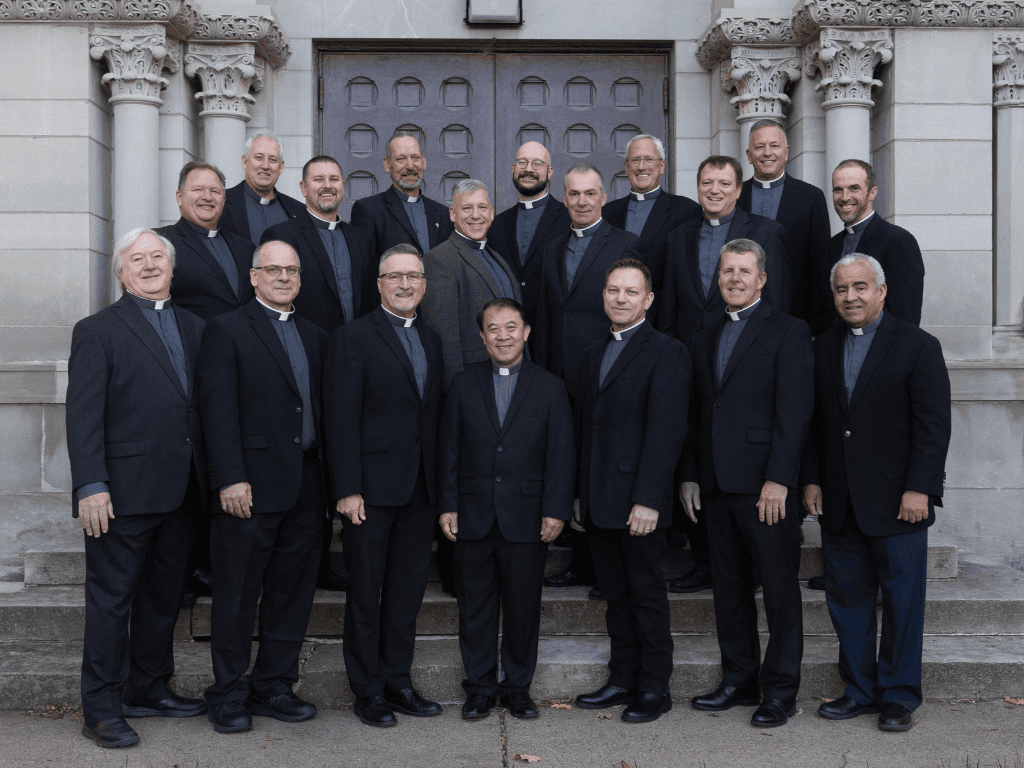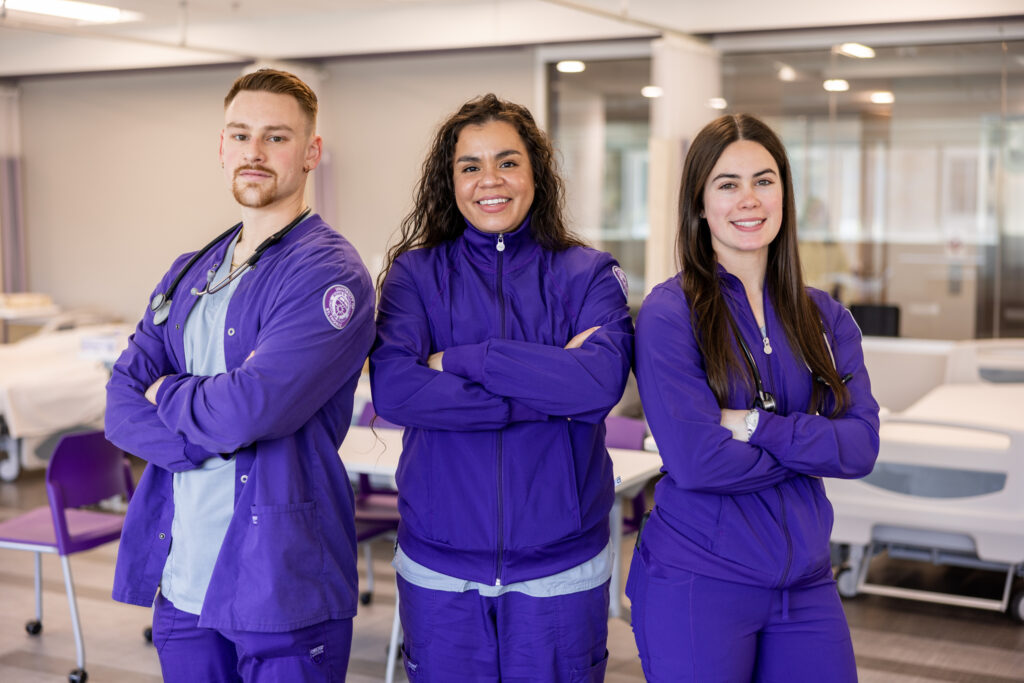Nazareth Hall Preparatory Seminary is the essential prequel to the story of Saint John Vianney College Seminary at the University of St. Thomas. How could we celebrate 100 years of college seminary formation in this archdiocese without acknowledging where the first 47 years quietly took place along the beautiful shores of Lake Johanna, north of St. Paul?
St. Paul’s first high school and college seminary remains a Christian institution since the University of Northwestern – St. Paul purchased it in 1970. “The 100th Anniversary of ‘Our Lady of the Annunciation’ Chapel at Nazareth Hall Preparatory Seminary” published by Liturgical Arts Journal contains an extensive history written by SJV alumnus John Paul Sonnen ’01. Beyond the fascinating institutional memories of Nazareth Hall – marvelously detailed in his article – personal stories abound. SJV was delighted to sit down with four alumni and capture their remembrances from four years of high school and two years of college at the hallowed grounds of 3003 Snelling Ave. N.
Q&A with Father George Welzbacher, Nazareth Hall 1940-45, ordained 1951
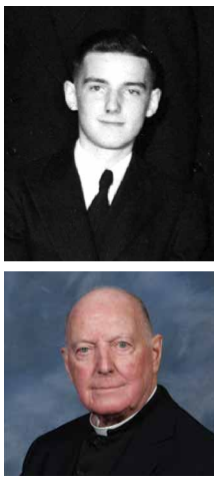
Tell us how you came to study at Nazareth Hall.
My mother and I were coming back one August night on the street car and got off right in front of the rectory of the cathedral. To our surprise, we turned and saw Archbishop John Gregory Murray emerge. We greeted him, and he asked me, “What do you want to do when you grow up, sonny?”
And I said, “I want to be a priest, Your Excellency.” My mother explained, “Yes, we’re just coming back from Cretin High School to enroll George as a freshman. My husband and I think military training would be good for George.” He replied, “Oh no! If you want to be a priest, you will go to Nazareth Hall. Tomorrow morning, you call Father Connolly, the new rector, and tell him I told you that you’re going to Nazareth Hall.” I don’t think that was an accident. It was too felicitous in its outcome for that not to have been planned by the Lord.
What was memorable about attending Nazareth Hall during the early 1940s?
The German sisters Archbishop Dowling brought over from the Rhineland provided our cooking and laundry, though many of us in the Twin Cities just mailed ours home in big laundry bags or baskets and our parents did it.
The sisters had the groundsman from Germany who spoke very little English. We called him “Uncle” and got to know him. He had been in the German navy in WWI and had a technique for propelling the rowboat just with one oar at the rear of the boat. After the U.S. dropped the bomb
on Hiroshima and Nagasaki three days later, he shook his head, saying, “Teufl” (the devil). WWII was devilish in so many ways for so many millions of people.
Keep our country in your prayers. I’ve never seen such division in our country as I see today. And the loss of religion among so many Americans is frightening because morality and patriotism disappears along with that.
What adventures did Lake Johanna offer?
During afternoon recreation, we could go swimming during summer school and skating in the wintertime. There was a small island just off the main campus with a chapel where a very generous donor was buried. We have the altar from that chapel and the pillar that supports the tabernacle in our chapel here (at the Leo C. Byrne Residence) from that island’s mausoleum. I remember memorizing Mark Antony’s speech from Shakespeare’s play Julius Caesar on that island because I could shout and no one was around.
Q&A with Pat Shannon, Nazareth Hall 1960-66
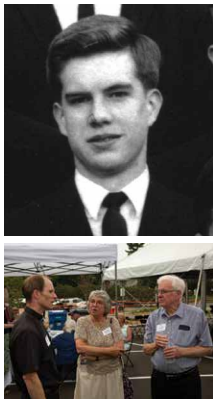
What led to your enrollment at Nazareth Hall?
I was an altar boy in grade school. I think that’s important to be at the altar as part of the discerning process. Our associate pastor took a bunch of us out to tour, and Nazareth Hall itself had an open house for prospective students.
How did Nazareth Hall prepare you for your vocation?
It’s a very high-quality academic environment. Six years of Latin, two years of Greek, two years of French, two years of German; they like languages! I went to the university because I wanted to be a classics major, so I continued with Latin and Greek and of course had more Latin and Greek than anybody. I ended up basically in graduate school! I attribute that preparation to Nazareth Hall too.
What advice would you give young men who are discerning?
You don’t have to figure this out on your own. It’s a good idea to talk to people who are in the midst of it, ordained and students. Discussions with them would probably be a good approach.
Q&A with Jim Cahill, Nazareth Hall 1959-61

What were your first impressions of Nazareth Hall?
There were priests everywhere, living examples of what a Catholic man should look like and how he should behave, that made it very special, powerful, and holy. Such contrast to the world for a young man of 18 or 19 to be brought up here. All that influence, the wonder of the Catholic faith, the purity of it – so much was given to us.
Do you have a favorite memory from Nazareth Hall?
There were about 16 priests at Nazareth Hall. One would say Mass so 15 would have to say Mass somewhere else, and we would occasionally be assigned to serve a priest’s Mass in the crypt. It was really a privilege to have that one-on-one time with a priest as you were aspiring to be like him. Afterward, the German nuns had a special breakfast for you of bacon, eggs, toast and orange juice at a little table. That was a good part of it too.
What did your time at Nazareth Hall teach you?
It taught you how to pray. Twenty-year-old guys don’t normally pray four times a day! Life was busy even back in the 1960s. We would go out to the main gate on Snelling Avenue, see all the traffic going by, then disappear back into the solitude of those many acres. That separation was important to form the heart and mind of men preparing for the priesthood, to learn solitude and peace being away from the world’s many distractions.
Q&A with Father Martin Siebenaler, Nazareth Hall 1947-53, ordained 1959
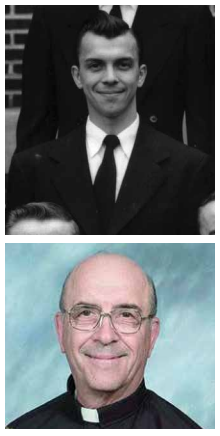
How did you finance your seminary studies?
Benefactors (from our parish) left an endowment for future education that paid one-third of our education. Dad paid a third and (my brothers, Father Leonard and Father John, and I) paid the other third after we could afford it. I think it was $300 or $400 per year.
We were born during the Depression and didn’t have anything. Our dad had to borrow $500 from Aunt Gertie and Uncle Clint each year and trade in his life insurance to buy a 1934 Chevrolet. That’s trust in God, isn’t it? The older you get, the more you appreciate your parents and what they had to sacrifice.
How did you spend your free time?
After supper, especially in October and May, we would go down to the Marian grotto on the lakeshore and pray a rosary. The smokehouse, attached to one of the sides of the building, was where the boys would talk over good times. We had a big field near the entrance for playing football and baseball. The sand burrs would stick to your stockings. I hit a baseball over the left fielder’s head for a triple one time. The college boys would help coach and taught us the three-point stance for football.
Who influenced your discernment spiritually?
We were taken care of by our good pastor. When riding to the seminary, he said, “We’re going to stop at the grocery, get a couple crates of apples and oranges, and ask the sisters to put them in their cooler so the boys can help themselves after class before they go out to play.” He died about four years after we started seminary and didn’t get to see us ordained.
The priest who took over helped nurture my vocation. I used to get bothered by tension headaches in seminary, but he told me, “You can do it.” Archbishop Brady ordained me and two other boys as transitional deacons in December, and we were ordained priests in February. No problem with headaches after that!
